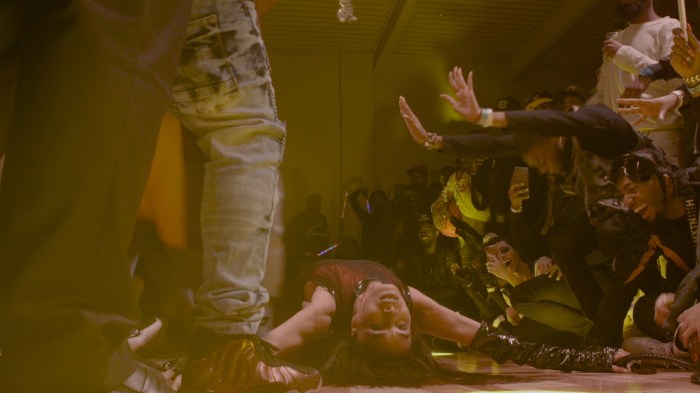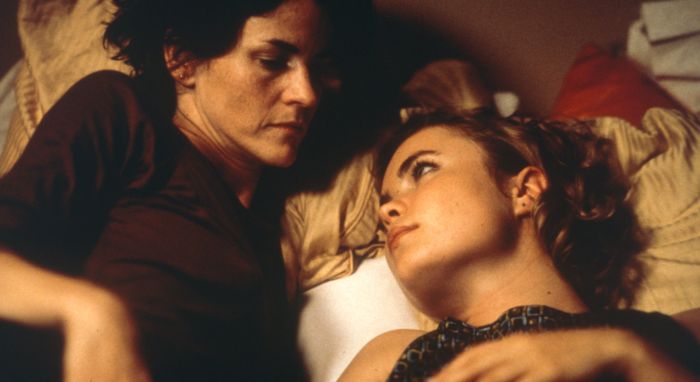Mariko Tsutsui, Momone Shinokawa, Kanji Furistachi, and Tadanobu Asano in Kôji Fukada’s “Harmonium,” which opens at the Film Society of Lincoln Center on June 16. | FILM MOVEMENT
The best films in the exciting wave of Japanese horror cinema that began about 20 years ago pointed to the fraying of the family as one of their main sources of tension and anxiety.
Takashi Miike’s “Audition” turned into a feminist revenge fantasy attacking the stereotypical assumptions of its male protagonist in his search for a demure, submissive woman. More subtly, Kiyoshi Kurosawa’s “Cure” depicted a Mansonoid hypnotist-serial killer who knew how to manipulate marital tension.
Twenty years later, a new Japanese film, “Harmonium,” has emerged from a relatively young director, Kôji Fukada, who has learned a lot from K. Kurosawa.
Kôji Fukada draws on influences Japanese and otherwise with “Harmonium”
It’s not a horror film. Were it a novel, it would probably be called a “literary thriller.” But Fukada has been inspired by Kurosawa’s skill at creating elliptical scenarios that only explain as much as they need to. One key piece of information is hinted at in the first half of “Harmonium” and frankly revealed in its second half. Beyond that, a great deal remains unexplained. Parts of the final third feel both dreamlike and not entirely unrealistic. Just when it seems like “Harmonium” has shown too much, it throws the audience another curveball.
Toshio (Kanji Furistachi) owns a factory that includes a large mechanized carpentry workshop. He lives with his Christian wife Akie (Mariko Tsutsui) and their young daughter Hotaru (Momone Shinokawa). A music student, Hotaru practices day and night on the instrument mentioned in the title: a pump organ used frequently in India but rarely heard in the West outside the solo albums of former Warhol Superstar Nico. One day, Toshio sees a mysterious old acquaintance, Mr. Yasaka (Tadanobu Asano), and immediately offers him a job. He seems to owe Mr. Yasaka some sort of debt, but the man looks more sinister the more we get to know about him (as does Toshio himself, for that matter). Then something awful happens, and Mr. Yasaka vanishes. Eight years pass, and the family is still searching for him.
“Harmonium” mixes up a cocktail of influences that includes Michael Haneke along with Kurosawa. Like the Austrian director, Fukada has a moralistic streak that extends to his characters (at one point, Toshio says that he feels like he’s being punished). Haneke goes further and sticks it to his audience for taking pleasure in watching violence or simply letting a narrative play out; fortunately, Fukada does not go that far. But both directors evidence a similar attraction/ repulsion regarding genre tropes, which benefits “Harmonium” to a large extent — it feels like distant kin to a mystery much of the time — but becomes trite when Mr. Yasaka and Akie have an affair, as if Fukada pulled his plot twists out of a potboiler.
Haneke and Kurosawa are both obvious stylists, while Fukada is a far more meat-and-potatoes director. Still, he knows how to use costume to create telling details about his characters: in a white dress shirt and black slacks, Mr. Yasaka looks like an avenging angel, not a guy looking for work or heading to it. At the same time, his “uniform” is so common that he can easily vanish into Japan, where many other people look and dress exactly like him. (Asano, who appeared in “Thor,” might be one of the most recognizable Japanese actors in the West, but you’d never know that from the way Fukada uses him.) The differences in the way “Harmonium” frames and lights the family home in the two halves of the film are equally expressive. In the first half, it’s a lived-in space; in the second half, a shadowy film noir set.
“Harmonium” never literally feels like a Kurosawa film, even if it seems to allude to an image in his 2001 “Pulse.” But it does a better job with the kind of spare storytelling at which the older director used to excel than his past few films have. It’s exciting to see a film that opens itself up to mystery and imagination without ever feeling superior to the audience.
Along the way, “Harmonium” does land in a few pitfalls, such as presenting Hotaru as an object of pity. But in the end, it offers up an image of a man trying to find solace when everything he knows has been methodically stripped away from him. Never mind that his mistakes are many; compassion lingers here among the enigmas.
HARMONIUM | Directed by Kôji Fukada | Film Movement | In Japanese with English subtitles | Opens Jun. 16 | Film Society of Lincoln Center, 144-165 W. 65th St. | filmlinc.org






























